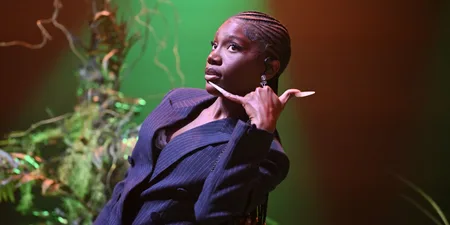Mick Jagger opens the concert by sprinting down the central runway towards the fans. One assumes that had the platform not abruptly ended he would have continued until takeoff, soaring right out of London Stadium.
The Rolling Stones are less a band than they are a study in scale and perspective. Individually they’re all giants, and not just because of the 40 feet tall television screens beaming their own image out above them like a Bat-Signal malfunction, flashing from Ronnie to Charlie, from Keith to Mick.
And Alfred will explain: “We’ve got a problem, Master Wayne. The Stones are playing Gotham and everybody will be there. Nobody will be robbing banks tonight.”
Watts, in particular, remains an incredibly absorbing performer, a tranquil, expressionless tour de force of mechanical precision and unspoken gravitas. Amongst the three stage-strutting peacocks in sparkling blazers and bright trainers – Wood, Jagger, Richards – it’d be easy to dismiss him as a plastic lawn flamingo, blank and motionless in the frenzied colour and dance.
The phrase to “never miss a beat” doesn’t apply to him. To miss a beat you’d have to actually be trying to make sure you hit it, conscious of the beat in the first instance. Charlie Watts is the fucking beat, and has been for 55 years. He doesn’t need to think about it. He doesn’t need to try or even pretend he is trying. He is monolithic and immovable; he doesn’t need to roll simply because he doesn’t need to go anywhere.
In front of him Ronnie Wood and Keith Richards sway in and out of each other’s path like figure skaters, change guitars like cowboys drawing guns and throw riffs and chords back and forth like this was all just a big snowball fight.
The two Stones guitarists wade together in synchronicity, and it is often impossible to tell where one ends and one begins in the patterned, silk weave music stretched through time.
Pinballing amongst it all is Jagger, an electron disguised as a rock and roll frontman, a man so energetic it borders on concerning.
He bounces with might and purpose for the full two hours; often shoving Richards in a direction along the stage so a certain section of the audience can bask in his lava lamp radiancy or shoulder-barging Ronnie Wood during a particular intricate guitar part, just to make things a bit more interesting or absorb some charge.
All this, of course, performed with pomp and grandeur still unworthy of any association with a Maroon 5 singer or chorus.
An unwanted question begs itself with The Rolling Stones though, how long can they continue to perform, and not just perform, perform like this?
Throughout the concert people check their mobile phones – ubiquitous now, just an idea when the Stones were – knowing that with a curfew of 10:30pm a sudden finality looms over an otherwise infinite performance.
The question shouldn’t be whether they can continue, or how long for, or even if they should.
The question should be what happens when it all ends. The writers will write, impossibly, trying to find something tangible before these men, more conceptual than physical, leave the stage for good. They won’t need to mention a single song, the music will echo on anyway.











































